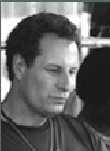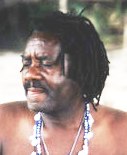|
|
|
The Authors
 Michael Ortiz Hill is an author, registered nurse and practitioner of traditional African medicine in the United States and among Bantu people in Zimbabwe. Born in 1957 to a Mexican Catholic mother and an Anglo Buddhist father, his life always involved moving between different cultural communities. Taught Buddhist meditation by his father as a teenager, Hill ultimately received formal training in the Zen and Vajrayana (Tibetan) Buddhist traditions. His father died when Hill was twenty, and during the years that followed, he brought his Buddhist practice to bear on hospice care of people with life- threatening diseases and underwent training as a registered nurse. During this time he practiced as a lay monk and spent a two years in complete solitude refining his meditation practice. His first book, Dreaming the End of the World: Apocalypse as a Rite of Passage, (Spring Publications,1992) examines the themes of death and rebirth that traditional rites of initiation share with the apocalyptic dreams of contemporary people. It is also an effort to understand the path of compassion during a tumultuous age. In 1992 Hill was in Los Angeles at the bedside of a dying friend when the city was consumed in the civil unrest following the Rodney King verdict. This led him to apply the insights he gleaned from examining apocalyptic dreams to racial, specifically, white people's dreams about black people and black people's dreams about white people. To do justice to the dream life of African Americans required a serious study of the African (predominantly Bantu) world that gave birth to black American culture. Early in his research, Hill began noticing African patterns in dreams of African Americans. After four years of preparation, he journeyed to Africa in 1996 where he met the Bantu healer Mandaza Kandemwa and through Mandaza became the first non-African initiated into the ritual tradition anthropologists recognize as the headwaters of what was to become African American culture. The fruit of this cycle of study and initiation is the Mapatya Trilogy. Capable of Such Beauty (unpublished) looks at the shape of the "white self" as revealed in white people's dreams about blacks -- and the breakdown of that "self" in the author as he submits to an African rite of initiation. The Village of the Water Spirits: The Dreams of African-Americans. is based on a series of interviews with Kandemwa interpreting the racial dreams of black Americans, offering a compelling picture of the African shape of the African American soul. Twin from Another Tribe:The Story of Two Shamanic Healers from Africa and North America. is framed around the autobiographies of twin brothers (mapatya), Kandemwa and Hill. Its special emphasis is on the ordeal of becoming medicine men (ngangas) and the practice of healing in two worlds -- Kandemwa among the poor in Zimbabwe, Hill as a nganga and registered nurse at UCLA Medical Center. In addition to the above-mentioned, Hill and Kandemwa cofounded the Nganga Project (now called Tatenda),a nonprofit that sustains African healing, makes alliances between healers of different traditions (African, Native American, Western biomedicine) between African tradition and African American community leaders and others as well. The Nganga Project purchased land in Zimbabwe -- a "peace farm" to collectively grow food for the hungry and draw together people from the various races and ethnicities in a country that has been ravaged by intergroup violence. Hills recent book, Conspiracies of Kindness: The Craft of Compassion at the Bedside of the Ill, is used to teach people the way of compassion. Hill has one child and three grandchildren. He lives as a hermit in the Sangre de Christo mountains near Santa Fe New Mexico. |
 Mandaza Kandemwa is widely recognized in Southern Africa as a traditional healer (nganga). Roughly 55 years old (he doesn't know the year of his birth), Kandemwa's father was poisoned by witches when he was a boy. Very much a child of poverty, he spent his early years living with various relatives, working the fields and, by his own volition, struggling to get whatever education he could in various missionary-run schools. Kandemwa came of age during the resistance to apartheid in his country and as a teenager was involved in clandestine activity. He was trained as a teacher and was recognized as having exceptional skill at organizing schools. In the late sixties, he was recruited against his will into the British South African Police as a consultant and ultimately a school administrator. During his tenure in the police force, Kandemwa was afflicted with severe water spirit disease, understood to be the call of the ancestors to practice as a traditional healer. He was then a staunchly religious Christian and did not heed the call and so suffered years of disorientation even as he rose in the ranks of the police. Eventually he dreamed he was to be initiated by an Ndebele nganga -- the Ndebele being the historical enemies of the Shona (Kandemwa's tribe). A few days later, his job transferred him to an Ndebele-speaking part of the country where he was approached by a stranger, a nganga, who ultimately took him through the rites of initiation. In 1988 Kandemwa married the Ndebele trance medium Simakuhle Dube with whom he has four children. On the eve of his promotion to the highest rank in police school administration in Zimbabwe, he left his job to be a full-time nganga and peacemaker, accepting no fee in working with the poor and working class people of Bulawayo, the country's second largest city. In 1996 Kandemwa was approached by the author Michael Ortiz Hill to be initiated into the water spirit tradition, and since then they have collaborated in the work of healing, initiation and understanding the deep African patterning in the dream life and spirit world of African American people. |
|
Copyright © Michael Ortiz Hill. All rights reserved. |